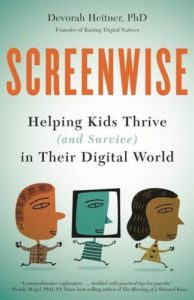[Book Review] Screenwise: Helping Kids Thrive (and Survive) in Their Digital World
As parents, many of us struggle betweend two styles of digital parenting.
Do I tightly monitor and filter my children’s online life, or do I allow them total freedom to discover and learn on their own. The concern of the former is that we’ll stifle and frustrate them, and we’ll be forever playing cop. The fear of the latter is the anxiety of what they will get into…or what will get to them.
In her newly-published book Screenwise: Helping Kids Thrive (and Survive) in Their Digital World, Dr. Devorah Heitner offers a sensible middle road to those two extremes: mentoring. By drawing alongside our children while they are learning to navigate all the ins and outs of online life and social media, we can guide them into a healthy relationship with both technology and other people.
What’s Inside
 Heitner presents a compelling argument for mentorship over monitoring, supported with a range of solid evidence, including her own research. She skillfully discusses the digital world version of topics like friendship, parent-child relationships, school issues, safety, and reputations. Among these discussions, we also hear conversations with the many students and parents with whom she has worked.
Heitner presents a compelling argument for mentorship over monitoring, supported with a range of solid evidence, including her own research. She skillfully discusses the digital world version of topics like friendship, parent-child relationships, school issues, safety, and reputations. Among these discussions, we also hear conversations with the many students and parents with whom she has worked.
This is a practical book; each chapter includes thought-provoking questions about our own digital parenting. While it’s not a “how-to” book, and you won’t find screenshots of how to set up parental controls on your child’s phone, you will find actionable steps that we all can take to better mentor our digital kids (and improve our own digital lives!)
Another thing that is (thankfully) absent from this book is the parent shaming and guilting that so often accompanies discussions of digital parenting. Heitner is kind to us as she encourages us to examine our own tech use and our approach to mentorship.
Nor is there the fear-mongering that leads to the parent panic about what technology is doing to our kids. Indeed, one of the early chapters is entitled: “The Kids Are Alright.”
My Take
Screenwise is an accessible book with a conversational tone. Heitner knows her stuff, and conveys it in an easy, well-illustrated manner. Yes, there is research and statistics and quotes from experts in this field, but she joins all that with the voices of kids and parents that bring the theory down to ground level.
My only real issue with the book is in its organization. As you read it, don’t expect a clear lock-step approach to mentorship. The subject is a nuanced one and much more of a mind shift than a step-by-step blueprint. As a result, there is some repetition of topics and issues throughout the book. Something that Heitner introduces early may not be covered in depth until a much later chapter. (Don’t worry, she always covers it later.)
These many threads sometimes left me thinking Haven’t I read this already? Granted, this feeling may also come from my own familiarity with the subject, her sources, and her other writing. It also reminded me of my own conversations with students and parents, which is exactly why I feel that this is such an important book.
In general, we parents tend to ask the wrong questions about technology. While monitoring has its place in our digital families, “Which filter is the best one to put on my kid’s device?” is not the key question to being a digital parent.
Heitner gives a call to action to think differently about how we are teaching, leading, and modeling tech use to our kids. She reminds us that we need to bring our wisdom to their tech savvy. Indeed, her final chapter has the ring of a “digital parenting manifesto” of the attitudes and responsibilities we should be taking.
If we want to successfully mentor our digital natives into a healthy digital adulthood, Screenwise will help us think differently about the role we need to play.

